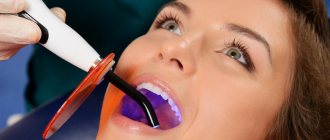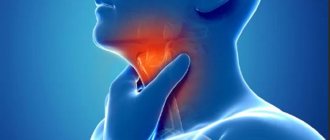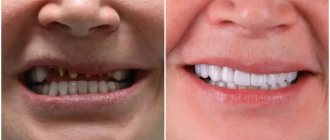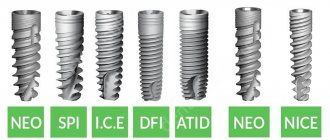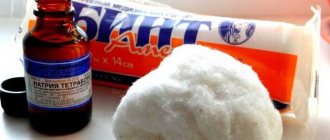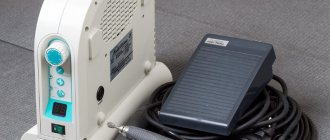Almost everyone has had to deal with toothache in one way or another. This symptom is a signal that there are inflammatory processes in the oral cavity that require the intervention of a professional dentist. However, when a toothache occurs, it is not always possible to immediately contact a specialist. Therefore, your first aid kit should always have products that will help relieve pain before visiting the dentist’s office. After all, these can arise quite suddenly, and getting rid of them without analgesics is not easy.
Tablets for toothache relief
Review of painkillers
Disadvantages of tablets
Painkillers for pregnant and nursing mothers
What not to do if your tooth suddenly hurts
In most cases, the first thing people do when pain occurs is take pills. This is the most common and accessible way to get rid of unpleasant sensations. Of course, the ideal solution would be to see a doctor, but there are different situations: there is no time, clinics are closed (tooth pain at night), financial situation, etc. We provide a list of the most effective remedies for toothache and we hope that you will use them only as a last resort case.
FAQ
Why does toothache occur?
Tooth pain is caused by a number of circumstances and dental diseases. Let's look at them in more detail:
Hyperesthesia
This is excessive tooth sensitivity that occurs when the enamel layer is worn away. Pain occurs when the tooth is exposed to cold, hot or sour food.
Traumatic fractures
When a tooth is injured, part of the crown often breaks off and the nerve is exposed, which leads to severe, often aching pain.
Caries
This is the most common infectious dental disease. Caries gradually destroys the tooth. Often, caries pain occurs in response to eating cold or hot food. If caries is not treated, the tooth is completely destroyed.
Pulpitis
With pulpitis, the patient experiences severe and acute pain. Often attacks of pain occur at night. If pulpitis is not treated, the disease goes into a chronic stage, in which the pain is not so strong.
Periodontitis
This is an acute or chronic purulent inflammation of the periodontium - the tissue around the tooth root. With periodontitis, the patient is bothered by severe sharp pain. If left untreated, periodontitis becomes chronic.
Review of painkillers
Table 1. Painkillers
| Drug name | Appearance | Characteristics and action |
| Nimesil | Available in the form of tablets, granules, suspensions. Recommended for mild to moderate toothache. | |
| Nise | Available in various forms. Suitable for mild to moderate pain. | |
| Ketorol | Available in the form of tablets and capsules for injection. Will help relieve moderate to severe pain. Maximum dose per day – 3 tablets | |
| Ibuklin | Available in tablet form. Recommended for mild to moderate pain. | |
| Tempalgin | Has anti-inflammatory and antipyretic effects. Does not irritate the gastric mucosa. | |
| Nurofen | Available in the form of tablets, suspension and gel (for external use). | |
| Took | Available in tablet form. Helps relieve moderate toothache. | |
| Analgin | Available in various forms. The maximum dose per day is 4 tablets. |
“Remember that the pill is a temporary way to relieve pain.
The effect of the drug will wear off, and the pain may return because the cause itself has not been eliminated. If after the first “bells” you do not go to the dentist, the disease will continue to progress. Each time the pain will get stronger and stronger" Irina Vinogradova, Dentist-therapist, endodontist, head of the department of therapy and periodontology, member of the medical council of the network of clinics "STOMPRAKTIKA.RF"
Antibiotics for gum inflammation -
The strategy for choosing an antibiotic for periodontitis, as well as the regimen of use, will be somewhat different. In most cases, antibiotics for gum inflammation are also prescribed “empirically”, i.e. without preliminary microbiological examination of the contents of periodontal pockets. But this may only be permissible for “mild severity” periodontitis. But with an aggressive course of periodontitis, as well as with moderate or severe periodontitis, we are obliged to refer the patient for microbiological examination.
The study will determine the composition of the microflora in periodontal pockets and determine its sensitivity to various antibiotics. For example, patients with moderate and severe periodontitis usually take antibiotics 2-3 times a year, which leads to the development of oral microflora resistance to them (i.e., many antibiotics will either not work at all or the effect will be negligible). It is also worth remembering that antibiotics can be used for gum inflammation only after preliminary removal of dental plaque.
Preparations "Tsiprolet-A" or "Tsifran-ST" -
If we do not send the patient for a microbiological study, then the 1st choice drugs will be 2nd generation fluoroquinolones. More precisely, these will be combination drugs that contain the combination “ciprofloxacin 500 mg + tinidazole 600 mg” (such combinations contain the drugs “Tsiprolet-A” and “Tsifran-ST”). Application regimen – 1 tablet. 2 times a day, for a total of 10 days.
Another option is that you can simultaneously take not a combination drug, but say, regular ciprofloxacin 500 mg 2 times a day, and in addition to it metronidazole or trichopolum - 500 mg 3 times a day (the course of treatment for each drug is only 10 days). Although this option is cheaper, it is worse. Metronidazole in this case will be a replacement for tinidazole. But in any case, you should not buy Russian-made antibiotics; for example, even Indian drugs are of much higher quality.
Important: the scientific work “Antimicrobial effectiveness of the systemic use of antibiotics of different groups in the complex treatment of patients with chronic generalized periodontitis” (Zorina O.A., Berkutova I.S.) shows that after the use of drugs such as “Tsiprolet-A” - in periodontal pockets 14 days after the end of antibiotic therapy, the lowest level of pathogenic bacteria is noted when compared with antibiotics of the macrolide group (azithromycin) and 3rd generation cephalosporins (Suprax).
Currently, the antibiotic ciprofloxacin is the only antibiotic in periodontal antibiotic therapy that suppresses absolutely all strains of A. actinomycetemcomitans (while it has minimal effect on the normal microflora of the oral cavity). In addition, when ciprofloxacin is administered orally, its concentration in periodontal pockets will be 8-10 times higher (compared to its concentration in blood plasma), and therefore ciprofloxacin is very effective against infection in periodontal pockets.
Combination of drugs “Amoxiclav + Metronidazole” –
We have already talked above about the antibiotics Amoxiclav and Augmentin, which contain a combination of amoxicillin and clavulanic acid. But if we need an antibiotic for gum inflammation, then we must combine one of these drugs - with metronidazole. Treatment regimen – Amoxiclav or Augmentin should be taken 1 tablet. 3 times a day (each tablet contains 500 mg of amoxicillin and 125 mg of clavulanic acid), as well as metronidazole - 500 mg 3 times a day. The course of treatment is 10 days.
Just do not buy cheap Russian metronidazole; it is better to take inexpensive metronidazole preparations from European manufacturers (for example, Trichopol or Flagyl). By the way, for patients who have gastrointestinal diseases associated with Helicobacter Pylori (peptic ulcer of the stomach and duodenum) - this scheme will also reduce the population of Helicobacter Pylori bacteria in the gastrointestinal tract.
Important: what to do if you need to choose between options - either the antibiotic Tsiprolet-A (Tsifran-ST) or the “Amoxiclav + Metronidazole” regimen. In principle, these 2 regimens are approximately equivalent - thanks to the addition of metronidazole to the drug Amoxiclav. But the “Amoxiclav + Metronidazole” regimen is still better, because in clinical studies it shows effectiveness against a significantly larger number of microbial associations in periodontal pockets.
Antibiotics for aggressive periodontitis –
Aggressive periodontitis means that the destruction of the bone tissue around the teeth, as well as the periodontal attachment of the teeth to the bone, will occur very, very quickly (24stoma.ru). Accordingly, tooth mobility develops in such patients many times faster than in patients with the usual course of chronic generalized periodontitis.
The development of aggressive periodontitis involves special types of anaerobic bacteria, which have the greatest destructive potential for the bone tissue around the teeth. We are talking about the “red triad” of anaerobic bacteria - these are Porphyromonas gingivalis, Tannerella forsythensis and Treponema denticola, the presence of which in a patient will mean a severe aggressive course of periodontitis. According to clinical studies, for aggressive periodontitis, one of the most effective antibiotics will be the antibiotic Moxifloxacin, which belongs to the 4th generation fluoroquinolones.
Important: in patients with aggressive periodontitis, it is fundamentally important to prescribe an antibiotic not empirically, but only after a microbiological examination of periodontal pockets (identifying the sensitivity of isolated microorganisms to different types of antibiotics).
Disadvantages of tablets
Painkillers also have a downside: almost all pills have side effects.
- Negatively affect the functioning of the digestive system. Erosion and ulcers can form on the walls of the stomach, so if there are problems with the gastrointestinal tract, it is better to choose a different method.
- Disturbs liver function.
- They can cause headache, shortness of breath, swelling, skin rashes, etc.
Most analgesics are prohibited for expectant and nursing mothers, young children and people with systemic diseases that are included in the list of contraindications. Therefore, it is recommended to consult a doctor before use.
Over-the-counter medications
All of the medicines listed above are freely available in pharmacies. You can purchase them without a doctor's prescription. It should be understood that analgesics and drugs with anti-inflammatory effects have a very strong effect on the body. They are, as a rule, very toxic, which means that in order to avoid unpleasant consequences, you must strictly follow the instructions for use.
Before taking such drugs, you should carefully read the included leaflet and study the list of contraindications and side effects. If, due to your health condition, the manufacturer does not recommend using the drug for you, then it is better to follow the advice in order to avoid a serious deterioration in your health and any complications.
Modern technologies for administering anesthesia
The pain of the anesthesia itself, as well as its effectiveness, depend 90% on the skill of the dentist. A professional doctor will make every effort and use various techniques to make the patient feel comfortable. However, all people are different, each has their own pain threshold, and that is why an individual approach not only to the concentration of drugs, but also to premedication before the direct administration of anesthesia is very important.
Today, special anesthesia devices have been developed to help doctors. Naturally, they work under the supervision of a specialist. The electronic system is equipped with special pressure sensors - to avoid pain, the anesthetic must be injected very slowly and immediately after puncturing the tissue. The device is equipped with special needles with a very thin double tip, which again reduces pain.
In addition, by administering a small dose of anesthetic, a kind of allergy test is performed - the doctor assesses the condition of the soft mucous membranes (swelling, redness, rash) and the patient’s general reaction, and the pressure force is controlled by the device.
Safe, painless and effective treatment without pain! Treatment is carried out under the supervision of anesthesiologists capable of providing first aid. Special equipment monitors indicators of the general condition of the body.
If there is any threat, the ambulance station is 800 meters from the clinics! You are under the reliable protection of professionals.
Enroll now
Important: combination of antibiotic and antiseptics
When treating gum inflammation (chronic generalized periodontitis), antibiotics alone are not enough.
In this case, treatment should be comprehensive - removal of dental plaque, antibacterial therapy, antiseptic mouth rinses + the use of a special anti-inflammatory gel for gums. Now we would like to tell you why it is important to combine antibiotics with mouth rinses with antiseptic solutions when treating periodontitis. In case of aggressive periodontitis, as well as moderate and severe periodontitis, in addition to pathogenic bacteria, fungal flora (fungi of the genus Candida) is also present in the periodontal pockets. The presence of fungal flora in periodontal pockets actually has a very important impact on the effectiveness of antibacterial therapy of gums for periodontitis. The fact is that fungi of the genus Candida form so-called “microbial associations” with pathogenic bacteria, which makes the bacteria insensitive to many antibiotics.
There are scientific works (source) that show the comparative effectiveness of different types of antiseptics and their different concentrations in the treatment of chronic generalized periodontitis, in which Candida fungi are present in periodontal pockets. Clinical studies show that there are only 2 antiseptics that are simultaneously effective against common pathogenic bacteria and Candida fungi for periodontitis. This is primarily 0.2% chlorhexidine, and also to a lesser extent 0.1% hexetidine (the drug “Hexoral solution”).
Important: most often, Candida fungi in periodontitis occur in the following categories of patients. For example, if your gum inflammation is of a long-term chronic nature (i.e., we are talking about moderate or severe periodontitis), with aggressive periodontitis. And also, if you smoke, or eat a lot of carbohydrates, or if you have concomitant chronic tonsillitis, or gastrointestinal diseases, or in the past - at least 1 case of candidiasis (thrush) of any localization.
→ The best mouth rinses for periodontitis, → Rating of the best gels for gums.
Antibiotics for implantation –
A separate issue of the use of antibiotics is their use in implantology - in preparation for surgery, its accompaniment and use in the early postoperative period - for the prevention of infectious complications, as well as for the treatment of already existing infectious complications (peri-implantitis). Read more about the choice of antibiotics in these cases in the article:
→ Choice of antibiotics in implantology
Bottom line
If you have a slight toothache (aching), you can do the following:
- take an aspirin capsule and drink a glass of water;
- give an injection of aspirin solution;
- light candles (for a child);
- drop drops (infant).
In case of severe pain and significant destruction of the tooth crown, crush the tablet into powder, dilute with a drop of water and place in a hollow. If there is an inflammatory process in the gum, place it on the swollen area. In addition to this, you need to take the capsule orally. Then you need to make an appointment at the dental office for treatment.
Painkillers provide only temporary relief, masking the pain syndrome. While taking analgesics, a person does not feel pain, however, pathological processes continue to develop. With repeated use of painkillers, the processes of destruction in tissues can become irreversible, and a person can expect long-term, expensive treatment.
The principle of action of analgesics is based on the relief of pain signals from the site of inflammation to the brain. However, the temporary disappearance of pain does not mean that the body is healing: it needs targeted therapy.
It should be remembered that the simultaneous use of the drug with other analgesics is prohibited: this will increase the toxicity of analgin. This combination of drugs is especially dangerous when treating infants: unforeseen complications may arise.
Sources used:
- Therapeutic dentistry. National leadership / L.A. Dmitrieva. - M.: GEOTAR-Media, 2015.
- Medicines in dentistry. Directory / L.N. Maksimovskaya, P.I. Roshchina. - M.: Medicine, 2001.
- Drugs.com Drugs.com international listings for Metamizole
Anesthesia methods
Depending on the goals and nature of the problem, the doctor chooses the method of pain relief. In medicine there are two main methods:
Anesthesia
It is most often used in surgery, and in dentistry much less often, in case of urgent need. It affects the entire body of the patient, inducing a state of sleep. At this time, all muscles relax and consciousness turns off. You can administer painkillers intravenously or inhale vapors through a mask. Deep anesthesia is used during complex operations when a person does not have enough strength to cope with pain or it is necessary to completely eliminate body movement. During sleep, the doctor monitors the patient's condition to avoid emergency situations.
Recovery from anesthesia is the body’s return to normal functioning after a long “freeze.” For all people, this process proceeds differently, some experience signs of nausea or a feeling of lethargy, while others wake up well-slept and rested.
General anesthesia in dentistry during pregnancy is applicable only in emergency cases when there is no other alternative.
Local anesthesia
Unlike anesthesia, it occurs locally, affecting only certain areas of the body. Can be used for children and pregnant women, without fear of unwanted consequences. In dental practice, this method is most often used, so we will talk about it in more detail.
Side effects
Symptoms of a drug overdose may include the following:
- attacks of nausea and headache;
- decreased appetite and tone;
- overexcitation of the nervous system;
- sometimes drowsiness and apathy;
- gastrointestinal disorders in various forms;
- interruptions in the heart;
- bronchospasm;
- noise in ears;
- allergic rashes;
- kidney disorder - anuria;
- leukopenia;
- convulsions.
If you find the listed symptoms of a drug overdose, you should immediately rinse your stomach, take activated charcoal, drink plenty of fluids and contact an ambulance.
Recommendations
For the successful use of anesthetics, there are two conditions: 1) the patient must abstain from drinking alcohol at least 24 hours before treatment; 2) feel good.
Often, after the effect of painkillers wears off, the patient experiences pain, swelling, tingling at the injection site, and difficulty opening the mouth (trismus). Within 2-4 days, all residual effects should disappear.
After treatment, sensitivity returns gradually, so take the food carefully so as not to accidentally bite yourself. It is also recommended to quit smoking during this time.
Operating principles
Anesthesia is carried out immediately before the start of treatment. The anesthetic comes in both liquid and gel form. The doctor injects into the soft tissues that are located near the diseased tooth. After some time, the tongue, gums and cheeks become numb and “freeze”. At this moment, the anesthetic acts as a blocker of nerve impulses that send a pain signal to the brain. The patient calmly endures dental procedures without experiencing stress.
The duration and effectiveness of dental anesthesia depends on the quality of the materials used and the location of the injection. The closer to the problem area the injection was administered, the more intense its effect. Each organism is individual, therefore the drug will be excreted at different rates.
Different types of drugs function in their own ways. For example, gel-like ones applied to the gums or surface of the cheek last only a couple of minutes. If they are installed in the upper part of the jaw, the effect will last for 2-3 hours. To treat the lower group of teeth, a deeper injection is required, so the result lasts up to 4 hours. After the solution is absorbed, the numbness disappears and sensitivity returns to the patient.
Anesthesia for children
Painless pediatric dentistry is a hot topic today. All parents know what a trip to the dentist means for a child. If this brings few pleasant emotions to an adult, then what can we say about children. The first scheduled visit is always scheduled for the age of 6-7 years - this is the time when baby teeth are replaced with permanent ones.
The psyche of children is not yet fully formed; one wrong word or action can provoke the development of unpleasant memories. Therefore, it is important to instill confidence in the child, to mentally prepare him for the procedure: explain why he is going there and what the doctor will do. The use of anesthetic agents in pediatric dentistry is an integral part of comfortable treatment.
The most suitable injection methods for babies are infiltration, conduction and application. The place where the drug is administered is “frozen” in advance and only then does the doctor give an injection. The child’s body is not yet fully formed, so in pediatric anesthesia, special medications are used that make it possible to carry out the procedure safely.
Nimesil during pregnancy and lactation
Nimesil, like other drugs of the NSAID class, is contraindicated for use during pregnancy and lactation. The active substance of the drug - nimesulide - negatively affects the course of pregnancy and the embryo, as it can lead to premature closure of the ductus arteriosus, hypertension in the pulmonary artery system, impaired renal function, an increased risk of bleeding, decreased contractility of the uterus, and the occurrence of peripheral edema.
Nimesil is contraindicated during pregnancy
Also, it is worth considering that Nimesil is not recommended for use by women who are planning to become pregnant, as the drug can negatively affect female fertility.
Features of pain relief in pregnant women
One of the most common misconceptions is that pregnant women are contraindicated for dental treatment. You should not trust unreliable sources; dentistry and pregnancy are completely compatible concepts. Expectant mothers should undergo a professional examination during planning and at 8, 18 and 28 weeks of pregnancy. Untreated infections in the oral cavity contribute to the development of other dangerous diseases.
The question immediately arises: can the use of dental anesthesia harm the health of the unborn child? Modern technologies allow the use of drugs with lower concentrations of adrenaline. Accepted painkillers are ultracaine, primacaine or mepivacaine*. They do not penetrate the placenta, therefore, do not harm the body of a pregnant woman.
*A verified and accurate list of acceptable medications can be obtained from your doctor.
Contraindications and adverse reactions
The main contraindication for taking the drug is hypersensitivity to the active component in its composition. Treatment with the drug in the 1st trimester of pregnancy is strictly prohibited. If possible, you should refrain from taking it during other periods of pregnancy and during breastfeeding until the child reaches 3 months of age. The drug is not prescribed to children under 10 years of age, and before reaching adulthood, when using the medicine, you should first consult a doctor.
Treatment with analgin should be discontinued if hematopoiesis is suppressed. In particular, agranulocytosis, which is characterized by changes in peripheral blood, is a contraindication. This is accompanied by severe symptoms: weakness, bleeding, problems with the digestive system, etc.
It is strictly forbidden to use analgin to relieve acute pain in the abdominal area until the causes of their occurrence are determined. It is also not recommended to use the drug for the following pathologies:
- Kidney or liver failure.
- Anemia.
- Leukopenia.
- Bronchial asthma.
- Pyelonephritis and glomerulonephritis
Failure to comply with contraindications and overdose may result in dangerous allergic reactions. This often manifests itself as a rash on the skin and Quincke's edema. In rare cases, anaphylactic shock, Lyell's syndrome or Stevens-Johnson syndrome develops.
You cannot take analgin for a long time for pain relief. Otherwise, you can provoke blood count violations. The risks of developing leukopenia or thrombocytopenia increase significantly.
Other possible adverse reactions of the body:
- An attack of bronchospasm.
- Reduced blood pressure.
- Malfunction of the kidneys.
If any negative side reactions occur, you should stop taking the drug. It is advisable to inform your doctor about this and consult about a possible replacement of the pain medication.
An overdose is recorded when using the medicine for a week in large doses to relieve pain. In this case, nausea and severe vomiting, decreased blood pressure and shortness of breath, delirium and impaired consciousness, as well as many other dangerous disorders of the body, may occur. You should urgently rinse and take saline laxatives. An increased drinking regimen and intake of absorbents are indicated. In severe cases, hemodialysis will be necessary.
Analogs of analgin
What can replace aggressive analgin? The reason for refusing this drug is life-threatening reactions of the body - agranulocytosis and allergies. The following medications are used to relieve toothache:
- ketorol;
- ketanov;
- ketorolac;
- naproxen;
- dolak;
- nimesil.
The listed drugs have a more gentle effect on the body when relieving pain. The disadvantage of these drugs is their high price and prescription. However, ketorol can be purchased without a prescription if the patient has severe pain.
Dosage
Only if it is impossible to take pills for any reason, intramuscular or intravenous injections are indicated. A single dose is 1-2 ml of a 50% solution of metamizole sodium. The daily dose should not exceed 4 ml.
To relieve pain, it is recommended to take a 500 mg tablet. For acute pain, the dose can be increased one-time to 2 tablets. You can take no more than 4 tablets per day, divided into 2-3 doses. The duration of therapy should not exceed 5 days. Analgin is taken as an antipyretic for no more than 3 days.
If you follow the dosage recommendations, problems with concentration and reaction speed are completely eliminated. Therefore, when using analgin to relieve pain, there are no restrictions on driving a car. Dangers arise only when large doses are used.
When using the drug, it should be taken into account that the toxic effects can be enhanced by other non-narcotic analgesics. It is also undesirable to use analgin simultaneously with tricyclic antidepressants and contraceptives. Barbiturates and phenylbutazone reduce the effectiveness of the drug, and sedatives and tranquilizers enhance it. The consumption of alcoholic beverages during pain relief with analgin is strictly prohibited.
Description of the drug and mechanism of action
The active analgesic substance in analgin is metamizole sodium, which reduces fever, blocks pain and stops the development of the inflammatory process. However, the effect of metamizole sodium eliminates the pain symptom not completely, but only partially. The feeling of pain remains, although not pronounced. Therefore, the use of analgin is justified if the pain is not acute. Any medicine based on metamizole sodium cannot cope with severe pain.
What is the mechanism of action of the drug based on? The treatment formula aims to suppress and block prostaglandins, which are responsible for the sensation of pain in the body. Prostaglandins are active substances that provoke the development of inflammatory processes in tissues damaged by bacteria and are responsible for transmitting pain impulses to the brain. Since the main effect of analgin is aimed at reducing heat in the body, it cannot completely relieve pain.
Also, analgin will not be able to block the development of the inflammatory process in the periosteum, gum or pulp due to its low effectiveness in this direction. Other medications are used to block inflammatory processes. Do not forget that this drug is mainly taken for colds and diseases with the presence of hyperthermia.




